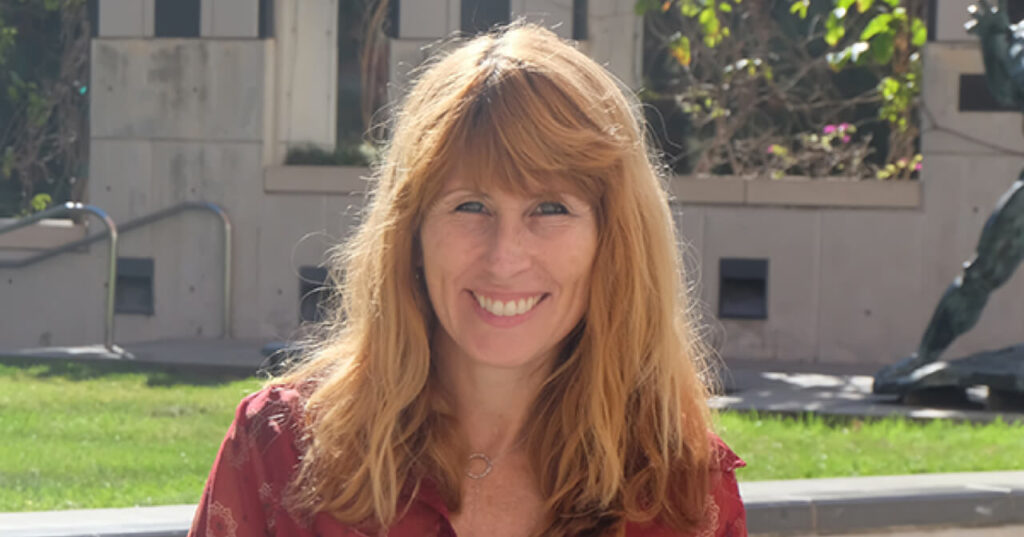Dr. Carrie Bearden, CAPPS & the NAPLS: Early Detection and Intervention for Psychosis

Psychosis is one of the most distressing and debilitating mental health symptoms one can experience, and the earlier someone afflicted receives treatment, the better the potential outcome. The best-case scenario: prevention. At the Staglin Music Festival Center for the Assessment and Prevention of Prodromal States (CAPPS) at UCLA, young persons at clinical high risk or in a first episode of psychotic illness participate in research to discover symptomatic and biological indicators for oncoming psychosis (i.e. the prodrome), and engage in preventive programs to strengthen their mental health. In 2015-16, under the leadership of Carrie Bearden, Ph.D., CAPPS has collaborated with the 9-site consortium of which it is a part to reveal powerful discoveries aiding prediction: elucidating a potential biomarker for the prodrome, and confirming evidence for several other biological markers.
Scientifically Predicting the Onset of Psychosis
In concert with the 8 other centers of the North American Prodrome Longitudinal Study (NAPLS), CAPPS has analyzed data from over 1000 subjects to identify several symptoms and biological markers which can be evaluated together to predict, with around 70% accuracy, the imminent onset of psychosis. In these analyses, two symptoms showed the most predictive power: unusual thought content (e.g. thinking that TV broadcasts contain messages directed personally to you), and feelings of suspiciousness (e.g., the notion that others are making fun of you). And, two biomarkers emerged as the most strongly predictive: a weak connection between the brain’s perception and cognition centers, the thalamus and the cortex, and a dysfunctionally rapid loss of gray matter from the cortex as a young person’s brain matures. Notably, this accelerated shrinking of the cortex was predicted by elevated blood levels of the stress hormone cortisol and of inflammatory proteins at the time of the client’s first test-these blood levels can not only be used as biomarkers in their own right, but suggest that this shrinking may be caused by stress and inflammation processes. Further blood study by the NAPLS has revealed still more predictive biomarkers in the blood, the most useful of which relate to modulating the immune system and stress. The NAPLS team has worked with Dr. Michael Kattan of the Cleveland Clinic to combine the most clinically feasible of these evaluations to launch a web-based psychosis prediction tool which, when fully tested, could aid clinicians worldwide in determining just how high a young person’s risk for psychosis might be, so that each patient could be treated at an appropriate level.
The Future of Psychosis Prodrome Research
Now that the NAPLS has been funded for its third round of studies, future research will investigate the mechanisms behind the hyperactive shrinking of the cortex seen to occur as the prodrome develops and risk for psychosis grows, focusing on inflammatory processes and their potential link to disruptions in neuroplasticity in critical brain circuitry. Also, CAPPS is collaborating with Guillermo Cecchi of IBM and Cheryl Corcoran of Columbia to analyze the language patterns used by youth in the prodrome to develop the means to predict conversion to psychosis based on syntax choices. Also, with funding from the NIH, the NAPLS has begun to combine resources and insights with early psychosis research centers across Europe and Australia in a “mega team science” effort to accelerate discoveries.
Making a Difference for At-Risk Youth
As a clinical prevention center, CAPPS is gaining a stellar reputation. This message came into One MInd Institute’s page on Facebook: “Thank you again for funding CAPPS/ABBRC. Our daughter, Anna, participated in the program 2012-2013. While this research helps others, know how much we appreciated participating with such genuinely dedicated people (very well selected to work with adolescents). It was very helpful for us as well, and provides us with even more hope. We’re so impressed with the program. The Ayres Family”
We at One Mind are grateful to our donors for enabling us to fund innovative early psychosis care now, and discoveries for even better care tomorrow, through CAPPS and the NAPLS Consortium.
